- Home
- Peter Grainger
Songbird
Songbird Read online
SONGBIRD
A KINGS LAKE INVESTIGATION
BY PETER GRAINGER
Chapter One
At that time of the morning the roads were clear of traffic even though the holiday season was about to hit its peak, and at first Waters drove quickly. In the half-light, a roe deer had crossed the road ahead of him as he passed through the woods of the Royal estate near Snettingham, and moments later a cock pheasant had launched itself up from the roadside and into his speeding path, the bird’s long tail brushing the windscreen inches from his face. After that he had slowed a little, just enough to make sure he arrived in one piece.
The call from Detective Chief Inspector Alison Reeve had woken him at 05.29 – the digits were imprinted on his memory and he had the feeling he was never going to forget them. Reeve herself had said it after giving him all the information she had so far – she had said, ‘Well, this is it, Chris. Apart from the two uniformed officers from Hunston, you’ll be first on the scene. As soon as DI Terek gets in, we’ll be sending other people up, depending on what you think is required, but that won’t be for at least an hour…’
Depending on what he thought was required, depending on his assessment of the situation. For an hour, maybe more, he would be in control of a crime scene for the first time, in command of it. Reeve had continued, ‘…you remember everything that needs to be done? Want me to run through it?’ No, ma’am, he’d said politely, and she hadn’t insisted.
When he reached the edge of the town, he dropped his speed to the legal limit. Already there were a few people on the pavements, some carrying newspapers or loaves of bread as if they were in France and not here on the East Anglian coast, but the heatwave had lasted for almost a month, so it wasn’t hard to imagine now that you were on the Costa del Norfolk. The people were in shorts, sandals and T shirts, enjoying the cool of the morning, holidaying, idling the time away, with no idea what was waiting for him not a mile from the centre of this small seaside town.
The turning was on the left, immediately after the traffic lights, at the corner with the only amusement arcade. The little land train that takes visitors the three quarters of a mile out to the beach was parked up at its mock station, and when Waters slowed again for the first speed bump he could see the elderly driver in his Victorian railway cap, polishing the brass bell that signalled arrivals and departures. Without a doubt, it was the same driver as it had been when he and Clare stayed here on the Pinehills caravan site more than three years ago, stayed in the caravan, which was, and still is, up here on the right, the third turning…
He shook his head a little to get his thoughts straight, and fixed his eyes back on the gravel track between the caravans. Of all the places in all the world, this had happened here. He could see the site office buildings ahead, and there were two cars. He thought about pulling in and seeing if Shirley Salmon, who still owned the place as far as he knew, was here and aware of what was taking place, and then decided against it – check with the uniformed officers first. The priority was always to get control of the crime scene.
If indeed it was a crime. People die of natural causes and that can happen as easily in the countryside as indoors. Or it might be a suicide, and for some reason those often do take place outside. All he knew for certain was that a woman’s body had been found on the edge of the pinewoods, close to a busy public footpath. Two uniformed officers from Hunston had arrived, confirmed that this was no hoax call – it had come from a dog-walker, naturally – and then the matter had reached the duty desk at Kings Lake Central.
The track, by now more sand than gravel, took a turn to the left. Waters drove past the small café that sells ice-creams and tea, plastic buckets and spades, little windmills and paper flags for sandcastles, and then, at the far end, where the track becomes a footpath, he could see the patrol car.
A small, elderly woman with two pedigree pugs on a single lead came towards him as he made his way along the footpath; it was narrow here and he stood aside for her. She said crossly, ‘You can’t get through. The police have closed it off.’
Waters said, ‘Yes, I know. I-’
‘They wouldn’t say why. They should at least tell you why. Especially if it’s going to be all day like they just told me. And we don’t know where else we’re going to go for a walk, do we girls?’
He looked down at the dogs. One was breathing so heavily its own demise might soon need investigating, and the other stared up at him. It had crossed eyes, the first dog he’d ever seen with such an affliction.
The woman said, ‘So you’ll have to turn around. You can’t get through.’
Having been sent back herself, she was plainly determined that no one else was going along the footpath.
Waters said, ‘I’m actually with the police…’
She looked dubious, so then he had to take out his ID card and she checked it.
‘Well, alright. Is it going to be closed all day?’
‘I couldn’t say, not until I’ve been up and had a look for myself.’
‘A look at what? What’s happened?’
‘I’m afraid that I really can’t discuss it. But-’
‘And do you get to decide? Are you in charge? You don’t look old enough.’
There was no point in carrying this on. Waters gave her a vacuous smile and waited. The woman turned away, took two or three steps and then turned again. She said with more menace than one might have expected, ‘Just don’t forget.’
‘Forget what, madam?’
‘Who pays your wages.’
He watched her go then, still muttering to herself and the girls, and wondered how things might have gone differently if she had met his old boss on this footpath.
He didn’t recognise either of the uniformed officers who stood together on the footpath just a matter of yards before it entered the pinewoods, but his ears were sharp enough to hear one say to the other, ‘Look up, the suits have arrived.’
It was true about the suit, he was wearing one. Nothing specific had been said but Terek always had a suit on, and since he had arrived most of the junior detectives had taken this as a hint. But there were times, like this one, when it felt out of place – six thirty on a sunny morning out in the dunes and pinewoods. And other times, too, when it was the wrong thing to be wearing, such as on the mean streets of Lake, when you wanted to get some sort of relationship going to gain some intelligence but a pinstripe seemed to represent the very authority that the people who had the intelligence most despised. He’d heard the snide comments about Smith’s ‘shabby chic’ but like most things concerning him, the longer you were in this job, the more sense it made.
When he reached the officers, Waters introduced himself, held up his ID and said, ‘I just met the old lady with the dogs. Have you sent many back that way?’
The constables glanced at each other. The younger of the two was as tall as Waters himself but much broader, a younger version of John Murray; the other was short, almost shaven-headed, in his forties and unsmiling. Eventually the older man said, ‘She’s the first but she won’t be the last, not along here. You need to get on top of this or they’ll be taking short cuts around, trampling over God knows what.’
Waters looked about him. From here he could not see the body but the tall grass to his left had been recently trodden down – there seemed to be a new path into a patch of low brambles and elder bushes. It must be there.
Encouraged by the silence, no doubt, the same officer said, ‘You all they’ve sent, then?’
‘No, I’m just the first to arrive. Is this the place?’
He pointed to his left. The constable nodded, not bothering to conceal a smile.
‘Yes, she’s in there. You go and fill your boots any time you like, son.’
They we
re both watching him again, and the man’s lack of respect was grating. All Waters needed was a few seconds to think, and their cooperation – surely not too much to ask.
The same officer continued, ‘But the thing is, this isn’t just a local footpath. It’s part of the coastal path. End of July? You could have dozens along here in a couple of hours, with kids and dogs all over it. Hell of a mess if you’re not careful…’
‘We need to tape it off to prevent that, straight away.’
‘Where d’you want us to do that, then?’
‘Back where the path leaves the caravan site.’
The constable nodded slowly, as if the instruction had passed some sort of test in his head, and then he said, ‘But what about the other end? People come both ways along here. It’s the coastal path, y’see?’
Waters sensed that his face was giving away some of the irritation he felt but he kept his voice as level as possible.
‘So we’ll need to tape it off from both directions.’
‘But where? This path runs all the way to Hunston!’
The man was laughing openly now, and plainly encouraging the other officer to join in – and Waters was wondering how this had all become awkward, and how soon Terek or Reeve would be calling him for an update.
He said, ‘Well, you’re the people with the local knowledge. Use your own judgement.’
‘Oh, I don’t know about that. We don’t get a lot of practice with that where CID is concerned, do we Steve?’
The younger officer still seemed unwilling to join in with it. He looked directly at Waters, who saw the opportunity and took it, saying to him, ‘OK, tape it off in both directions and one of you stays at each position until I can get more people out here. Where’s the person who found the body this morning?’
It was the younger officer who answered now.
‘We let him go. He said his wife is disabled and he needed to get back but he’s staying on the caravan site. We got his phone number and the address.’
‘Good, I’ll need those. Do you have enough tape? There’s some in my car if not.’
The older officer said, ‘I expect we’ll manage to find some tape and that.’
Waters stepped off the path, steeling himself for what had to come next. He took three or four steps, stopped, turned and walked back to the man who should have known better. Their eyes met and Waters said, ‘I think you meant to say, “I expect we’ll manage, sir”.’
Chapter Two
He saw a bare arm first, the hand palm up with fingers curled inwards. Then he stopped and took a few breaths. He could hear the two constables making arrangements before they separated, one saying he’d bring the other some tape from the car, and then it was just the early summer morning quiet again.
The training isn’t as long as people might imagine but it is intensive. He has already made mistakes, so stop and go through the list in your mind. Save and preserve life; the woman is dead and there are no other lives at obvious risk. But which of the two officers checked the body closely enough to ascertain that she was dead? He should have asked, and were they wearing any protective clothing – clothing to protect the integrity of the crime scene? Where is his own protective gear? In his pockets and his car.
He retreated a few steps, took out the disposable blue plastic shoe covers – which are never disposed of until a case is completed and all possibility of appeal is over – and pulled them over his shoes. From another pocket, he took a pair of matching gloves.
Provide emergency first aid for those injured at the scene. Too late for this poor woman, and there’s no suggestion of anyone else being around. But, of course, it isn’t impossible there is another victim… Nevertheless, he cannot conduct a search for one because that could compromise the crime scene.
Ensure the scene is safe for investigators and forensic examiners. Some of those bramble bushes look as if they could make a right mess of a plastic suit – he can hear Smith’s voice and tells himself to focus again. A lot could depend on this, on someone saying after today that Detective Sergeant Waters is a safe pair of hands.
Secure and preserve the crime scene, keeping a record of everyone who enters and leaves. This he can do. The tape is already going up and the public are being kept away. Make sure you get the names of those officers and a record of exactly where they went and what each of them did when they arrived on the scene.
He moved forward again slowly, step by step, placing each foot where there was already an indentation in the grass. He saw the arm again, pale against the dry, straw-coloured vegetation. This heatwave will soon turn into a drought… It was her left arm and there were rings on the third finger, gold rings. Don’t just look – make sure you see as well. He narrowed his eyes and saw an engagement ring, a wedding ring and bright red varnish on long nails.
Two more careful steps and he could see the rest of her. She lay on her back, her head turned to the left and resting on her shoulder-length, copper-red hair. The right leg was straight, the left was half bent at the knee, exposing her groin. Waters looked away for a moment because she was uncovered there – when he looked back he could see her underwear looped around her right ankle. A short, blue skirt was rucked up around her waist, and a white blouse looked as if it had been torn and pulled open, partly exposing her breasts. There was a bra but it had been pushed up and lay across the top of her chest. Finally, he looked at her feet. One silver, high-heeled shoe, the right, was half on the foot, the other lay in the grass, a few inches away from her left foot.
He looked away again, breathing deliberately slowly. This was not the first victim he had seen, but… But it’s different when you’re on your own and when you know that the last but one person to see this awful thing was the individual who had done it, who had done this to the poor woman.
A glance at his watch told him ten minutes had passed since he parked his car. Then he took out his phone and found he had a signal, one bar, which out here was a minor miracle. He debated whether he should call Reeve or Terek, and then he thought about what he might be asked if he did so. What else should he have done by now?
He took one more step into another depression in the grass, almost certainly made by whichever officer had come this far, and leaned down towards the body, close enough to examine a wrist for a pulse. There was no colour in the face and her eyes were partially open – funny how they never are in films or on the television. There is something profoundly disturbing about sightless eyes – maybe that’s why. The mouth was open and her swollen tongue protruded a little, lolling to the left. There was an extensive mark on her right cheek which was probably a bruise, and her neck was heavily discoloured. No blood visible anywhere, and Waters guessed she had been strangled.
In the end, he didn’t touch her because he had never seen anyone more obviously dead, but he made himself look over the corpse again. He had no personal experience of rape investigation but that was surely in part what they were dealing with here, and his training had involved the collection of evidence in such cases. He had seen and studied photographs, albeit in a lecture theatre with thirty other detectives.
So, the bruising on her face suggested a violent assault, probably a punch or punches, and being on her right side might suggest a left-handed assailant. The parts of her breasts that he could see bore no marks. Then he looked at her legs, the insides of her thighs, and finally at her crotch. Nothing out of the ordinary – as if doing such a thing as this on a bright July morning could ever be anything but extraordinary. No further bruising, no scratches or cuts anywhere.
Waters returned to her face then, trying to come to some conclusion about her. She had put on plenty of make-up the evening before. There was light blue eyeshadow, finely plucked and pencilled eyebrows, foundation and blusher, and lipstick that matched her nail varnish, but when the blood drains away beneath the skin after death, the effect of all this artifice becomes the opposite of what was intended – the underlying pallor produces a ghastly, unnatural, doll-like appea
rance. And the final irony was the usual one; she had been an attractive woman anyway, without all that, probably in her thirties. He felt suddenly quite sorry for her, aware of the impulse to reach out and touch her arm in some odd gesture of reassurance, as if to say it will be alright, but of course it never would now.
As he stepped back onto the footpath, his mobile began to ring. It was Detective Inspector Terek – he wanted to know what the situation was on the ground and whether there was a phone signal where the body had been found. As they were having this conversation, Waters thought, the second question was superfluous, until he realised what Terek was driving at – if the woman had had a mobile, the signal could be used to follow her movements, and, if they were lucky, the movements of anyone else they were questioning about her death.
After listening to Waters’ account of what he had seen and done, Terek said, ‘Good, it sounds as if you’ve followed protocols to the letter. I’m at Central now but I’ll be out with you as soon as everything is moving here. Scenes-of-crime and the photographer should be there by nine o’clock. Nothing at all on the woman’s identity?’
No, said Waters, but the chances were that she was from the caravan site – she probably hadn’t walked far in those shoes.
‘Really? That’s useful. You need to stay close by the victim until the teams have arrived but then we’ll find the site manager. Hunston have been told to send up every spare officer as they come on shift, so you should have more people there soon. If you – oh, stay on the line, here’s DCI Reeve.’
Waters could hear a conversation taking place back in Kings Lake. Should he tell Terek that he knew the owner of the caravan park, that he had even stayed here on a couple of occasions? Terek is funny about procedures and propriety sometimes. He has this thing about professional distance and-
‘Chris? I’ve relayed everything to DCI Reeve. She is saying you’ve done a great job.’

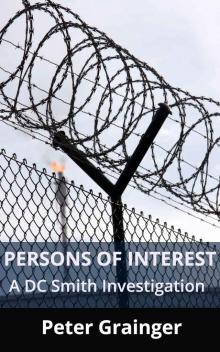 Persons of Interest
Persons of Interest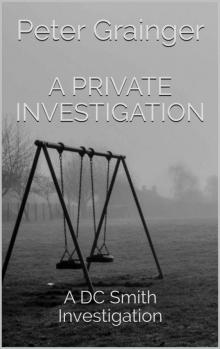 A Private Investigation
A Private Investigation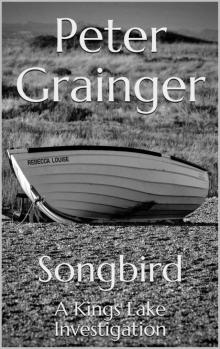 Songbird
Songbird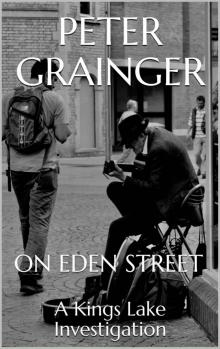 On Eden Street
On Eden Street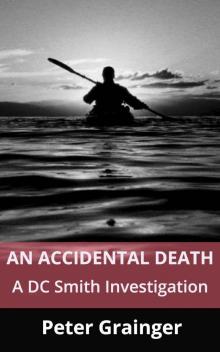 An Accidental Death
An Accidental Death Time and Tide
Time and Tide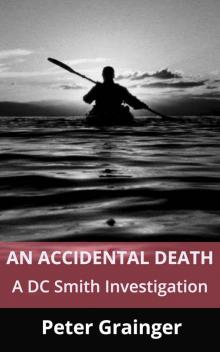 An Accidental Death: A DC Smith Investigation
An Accidental Death: A DC Smith Investigation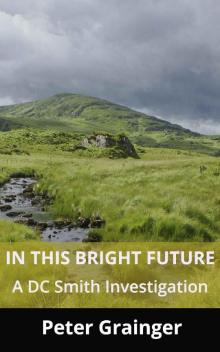 In This Bright Future
In This Bright Future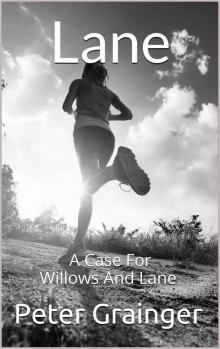 Lane: A Case For Willows And Lane
Lane: A Case For Willows And Lane The Rags of Time: A DC Smith Investigation
The Rags of Time: A DC Smith Investigation Luck and Judgement
Luck and Judgement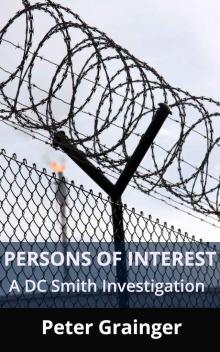 Persons of Interest: A DC Smith Investigation
Persons of Interest: A DC Smith Investigation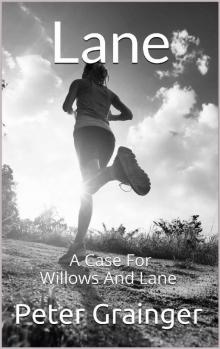 Lane
Lane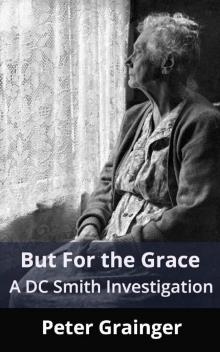 But For The Grace
But For The Grace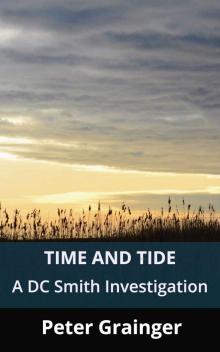 Time and Tide: A DC Smith Investigation
Time and Tide: A DC Smith Investigation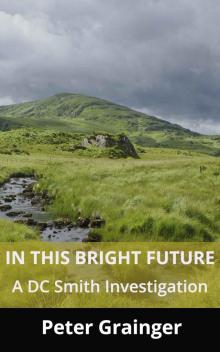 In This Bright Future: A DC Smith Investigation
In This Bright Future: A DC Smith Investigation The Rags of Time
The Rags of Time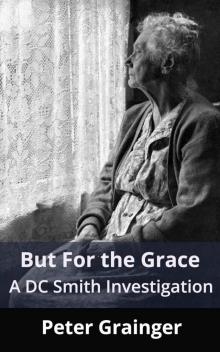 But For The Grace: A DC Smith Investigation
But For The Grace: A DC Smith Investigation Luck and Judgement: A DC Smith Investigation
Luck and Judgement: A DC Smith Investigation